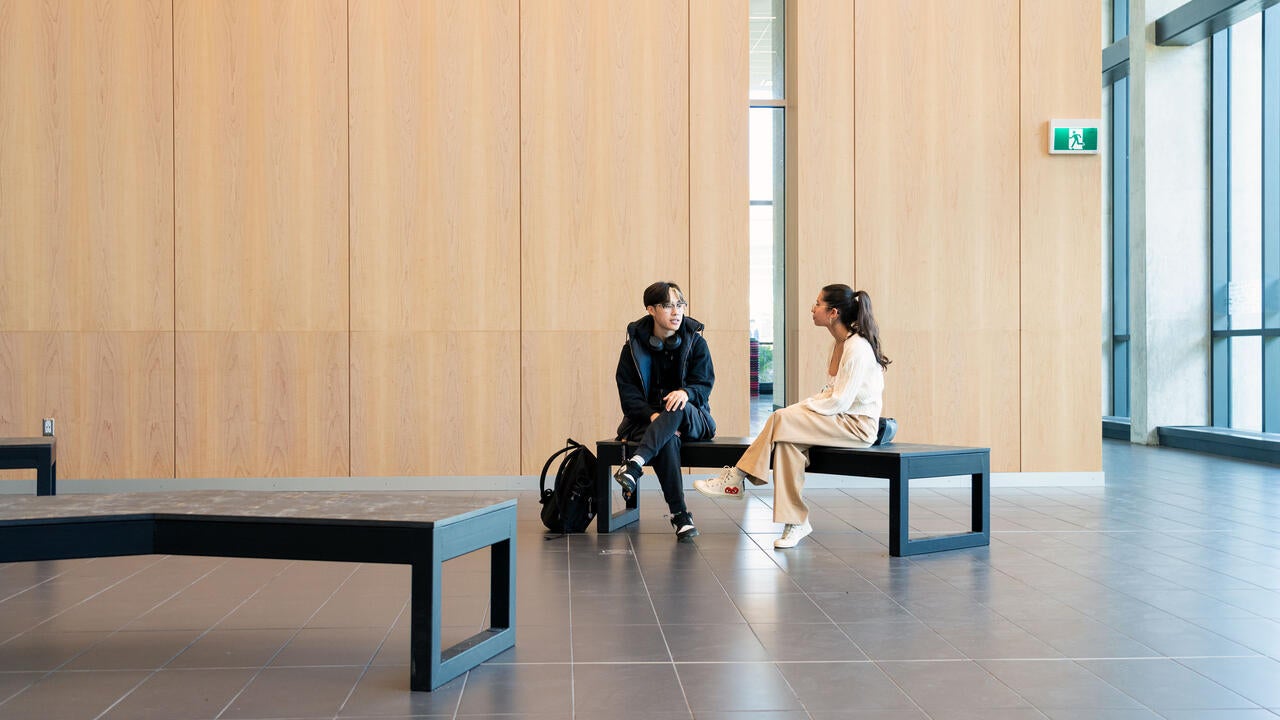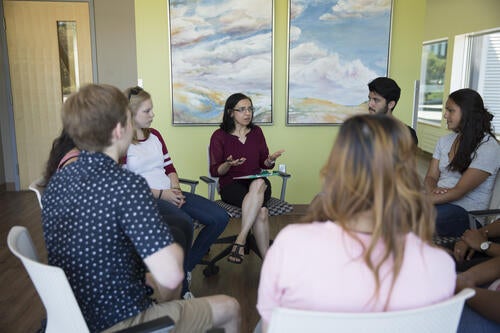
Making mental health a priority
Mental health care at the University of Waterloo

Mental health care at the University of Waterloo
By University RelationsAs students at Waterloo head into the final exam season, and with the holidays fast approaching, the University is renewing its focus on sharing both the mental health supports that are currently available for the community and the continual work we do to improve the options that we offer.
“The state of mental health in our country’s young people is arguably more fraught now than it ever has been,” says Vivek Goel, Waterloo’s President and Vice-Chancellor. “But there is reason for hope. Our young people are speaking about their struggles, they are destigmatizing mental health issues and they are asking for help. We as a University will continue to be led by their bravery. We will continue to examine our services and continue to make them better.”
Building on work undertaken in 2012 to increase mental health supports for students, the University established the President’s Advisory Committee on Student Mental Health in 2018. The goal was simple – to offer the best possible environment at the University for supporting student mental health.
Following hundreds of conversations with academic leaders, community partners and students — the committee released a report containing 36 recommendations about how to improve the student mental health experience. With areas of focus including social support, mental health awareness, early intervention and skills building, service levels and improvements and advocacy, it was a comprehensive plan. Since its release, the University has implemented more than 90 per cent of the recommendations.
This work continues now, with the new systems and support set-up as a result of that Committee sharpening the University’s ability to constantly examine and improve its offerings.
Funding for Campus Wellness now sits at more than $8 million dollars annually — a 50 per cent increase from 2018 levels, with the entire team dedicated to supporting student wellness. Faculties are also beginning to embed wellness staff to offer students a point of contact to help them navigate the system and who are easily accessible and familiar to them.

Campus leaders recognize that university life can be demanding, which is why they go to great lengths to support students before a mental health crisis develops. There are opportunities to be active through many different athletics and recreation programs and resources to learn about healthy habits, such as sleep, nutrition and mindfulness, through the Peer Health Education program. Additionally, many clubs and social activities are available through the Graduate Student Association (GSA) and the Waterloo Undergraduate Student Association (WUSA) and Campus Housing provides support for those living on campus. Multi-faith spaces are also available in several different locations across campus for prayer, reflection and other faith-based activities.
In addition, students can meet with peer success coaches, who are upper-year undergraduate and graduate students from different faculties who teach students key foundational study skills and strategies for academic success. Decades of research have confirmed that positive time management practices, as well as skills related to managing test anxiety, can help to mitigate mental health challenges before they arise.
Students also benefit from the work of the Wellness Collaborative — a hub of activities and initiatives governed by the principles of the Okanagan Charter; an international charter for health promoting universities and colleges.
If a crisis does happen, the University offers same-day crisis appointments every weekday at Campus Wellness. Mental health professionals at Campus Wellness are passionate about ensuring a secure, supportive environment for students of all orientations and backgrounds. Counselling and medical services are provided in a private and confidential setting to all Waterloo students who are currently registered or on a co-op term. After-hours crisis support is offered through the IMPACT program as well as through the GSA/WUSA-administered program Empower Me.
Campus Wellness is also available to talk to family or loved ones concerned about their student’s wellbeing. Together, they will discuss the student’s options and the best way to get them connected to the right supports.
No student’s experience at Waterloo will be the same, and therefore finding the right services that match their needs is important. Waterloo is committed to continually assessing and improving the services available to our students so that we can do just that – ensure that each student has the help they need, when and where they need it.
If students or their loved ones at Waterloo are struggling, here are just a few of the services offered at Waterloo:
Group therapy and workshops
Students can attend a group therapy, seminar or workshop at Campus Wellness to learn skills for coping with challenges. They can also watch pre-recorded workshops and seminars on their own time.
Individual appointments
During an individual appointment, counsellors at Campus Wellness work with students to determine the best approach for them. This could include cognitive-behavioural therapy, mindfulness exercises, and many other approaches that will be tailored to the student’s needs. If a student has specific needs or would like to request a counsellor with lived experience or identity (e.g., 2SLGBTQ+, BIPOC, and others) they can request this through our intake specialists.
Resources to support a friend or family member
Students may notice that a friend or family member is struggling with their mental health. They may want to help, but it can be hard to know how, or if they should approach them. When trying to support your friend or family member, it’s important to remember the limitations of your own knowledge. Campus Wellness has resources to help students navigate these situations and more.
Medical Appointments
Campus Wellness physicians, psychiatrists, nurses, nurse practitioners and a social worker are available to work with students who are experiencing physical and social symptoms of mental health issues. Together with the counselling team, the Campus Wellness medical clinic provides wrap-around care for students in need.
Mental health training opportunities
Campus Wellness also offers a broad range of suicide intervention and mental health training programs to equip staff and faculty in supporting our students. Our goals are to raise campus mental health awareness, reduce mental health stigma, and support early intervention for those in need within our Waterloo campus community.
Campus Wellness counselling
The Campus Wellness team provides in-person services as well as remote appointments via phone and video. To book an appointment, students can call 519-888-4096.
Hours:
If it’s after hours, students can call Empower Me at 1-833-628-5589 or Here 24/7 at 1-844-437-3247. Empower Me is provided through GSA and WUSA.
Campus Wellness services and individual appointments are available to registered Waterloo students in classes or on co-op terms.

Read more
Six steps to getting exam ready

Read more
Meet Dr. Sandra Lopez-Rocha from the Student Success Office

Read more
Upside Robotics secures new funding to accelerate the future of sustainable farming
The University of Waterloo acknowledges that much of our work takes place on the traditional territory of the Neutral, Anishinaabeg, and Haudenosaunee peoples. Our main campus is situated on the Haldimand Tract, the land granted to the Six Nations that includes six miles on each side of the Grand River. Our active work toward reconciliation takes place across our campuses through research, learning, teaching, and community building, and is co-ordinated within the Office of Indigenous Relations.